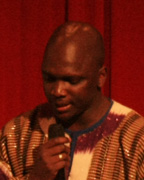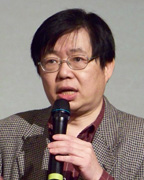
TAIPEI, Taiwan — A Gambian ‘civil activist’ is calling on Africans to put aside past hurts and “look onto the future” even as a professor says that many of the continent’s problems are vestiges of its colonial past.
The call came from Gambian Yusapha Touray as he spoke on “Reflection on Africa” at the first African Cultural Night here on March 28.
“China, America, India and even Taiwan have all been subjected to colonialism, but where are they now? Is there any justification to continue this lamentation of slavery, colonialism and neocolonialism?” he said.
Touray said some cultures have “concocted numerous myths, some with the intent of dragging the African and African origin into dishonor.”
He further spoke of racism against African, saying that “baser desires are associated with blackness” and mentioned “imposition of culture” and “continuous social reinforcement”.
“Does this clearly explain why some Africans are trapped in the cultures and languages of other people, especially of the west, and even conduct themselves subjectively and intellectually as one of them?”
Touray was speaking at an event in which students from Soa Tome and Principe performed the Ussua dance, the moves and costume of which were adopted by African slaves from their Portuguese enslavers.
He said that scientific research suggests that all races began in Africa and added, “Can you now see the baseless nature of racism?”
He said that Africa has the world’s richest concentration of minerals and gems but needs both physiological and psychological food.
“The way poisoned food ultimately destroy liver, the same way certain forms of information stop the heartbeat of communities,” he said.
He said there was nothing wrong with adopting the political ideologies of nations such as the United States of America.
“What I think is wrong is the importation [of] their culture, or the swallowing of hook, line and sinker. Democracy as an ideology is fluid in nature and can fit any culture. Culture on the other hand is dimensional and solid in nature.”
He said there was hope for Africa but the people of the continent “must sit in the steering wheel ourselves, and redefine our priorities”.
“The people should stand out first and forget what the ancestors did to one another and look onto the future. Only then can we recognize the beauty that lies ahead of us.”
Ethnic conflict compounded by religion, languages

Meanwhile, Professor Chan-Shen J. Yen of the National Cheng-Chi University Institute of International Affairs here told I Witness-News that many of the problems Africa faces today are linked to the “colonial creation of new nation states”.
He said that the same ethnic group was spread into different countries and some rival groups were put in the same country.
“So you still have a lot of this ethnic conflict in part of Africa compounded by different religions, different languages, so what we have is a reinforcing cleavage in some of the countries,” said Yen who is also Secretary General of the Forum on African Studies in Taiwan.
He said resource management is also a problem in Africa.
“…Even if African countries can nationalize [these natural resources] today they will not be able to market them because the market has been controlled by the multinational.
“Africa has to learn from some of the international rules which a lot of countries in the early 60s or during the colonial times did not pay special attention [to] and then they are in this kind of legal trap. They lost to themselves.”
He said that Africa must understand these international norms, adding:
“Of course, African leaders should be more accountable so that they would not collaborate [with] some of the western multinational companies and then you know basically sell the resources at a lower price but benefitting themselves and losing the wealth of the nation to the west.”
Professor Yen said Africa “has been very open minded” as evidence by the influx of the Arabian and western cultures.
“There are a lot of things that you can learn from other countries but basically you want to preserve what former president [of South Africa Thabo] Mbeki said about going back to your roots, finding the culture, finding some of the achievements you have (had) individually,” he said.
He said that democracy was once considered a western ideology but in the 1990s countries such as Malawi began to form national affairs conferences.
He said such practices existed in Africa before colonial times when the chiefs the respective groups tried to “organise and reach consensus”.
“Africans stress a lot on consensus but consensus is not necessarily in contradiction to democracy. Democracy sometimes is just voting but we think that consensus is in a way not allowing a majority vote but it is still a way to reach something people want, so interacting and also responding to the needs of the people.
See also: Students bring African culture to Taipei





